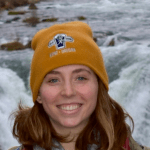By Sienna Fitzpatrick, Community Development Specialist, Central Oregon Intergovernmental Council
Since moving to Oregon 18 months ago, I didn’t expect to experience so much growth, chaos, beauty, and community. My friends are scattered across the state, the country, and the continent; my professional skills now extend to community outreach, strategic planning, event planning and grant writing—and I’ve still got four months ahead of me with some of the biggest challenges I (and the rest of the world) will ever face. But RARE, more than anything, is not simply about doing what you were assigned to do; it’s about figuring out what your community needs, wherever you may be, and finding in yourself a willingness to address it no matter how much experience you have.
I am filled with the same uncertainty, fear, and grief that so many of us are feeling right now as a result of the COVID-19 pandemic, but knowing that I am part of a network as vast and esteemed as RARE and that I am (virtually) surrounded by people who know exactly what I’m going through helps me pick myself up each morning and get back to work. Most of that work right now is just listening to business owners and being present in the rural communities I serve, which doesn’t always feel like it’s enough. When the horizon clears and the dust settles though, I know I’m exactly where I need to be to help in the recovery.
Now more than ever, communities will need capacity to rebuild their economies; our nation’s workforce will need professional experience to keep moving towards their goals; and all of us will need to find our place and people to weather the future together. While this program was leaps and bounds outside of my comfort zone, I wouldn’t change where it has taken me, the people it brought me to, or the skills I’ve gained. RARE gives a lot, and expects a lot of its members, too, but one guarantee is that you are never alone.
 About the author, Sienna Fitzpatrick: Sienna spent last year in the RARE program serving Southern Oregon, and naturally fell in love with the beauty, opportunity, and challenges of this great state. In the last year, Sienna realized her passion for community building and decided to pursue a new project through RARE that would help her explore that career area, which lead her to Central Oregon. Sienna’s background is in environmental policy, science, Spanish, and extensive volunteer experiences, positioning her to see the big picture and the “story” behind every project she works on. In her free time, Sienna enjoys photography, traveling, and spending time with loved ones.
About the author, Sienna Fitzpatrick: Sienna spent last year in the RARE program serving Southern Oregon, and naturally fell in love with the beauty, opportunity, and challenges of this great state. In the last year, Sienna realized her passion for community building and decided to pursue a new project through RARE that would help her explore that career area, which lead her to Central Oregon. Sienna’s background is in environmental policy, science, Spanish, and extensive volunteer experiences, positioning her to see the big picture and the “story” behind every project she works on. In her free time, Sienna enjoys photography, traveling, and spending time with loved ones.


